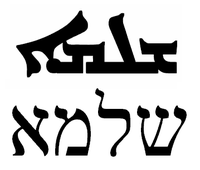
Shlama
Encyclopedia

Peace
Peace is a state of harmony characterized by the lack of violent conflict. Commonly understood as the absence of hostility, peace also suggests the existence of healthy or newly healed interpersonal or international relationships, prosperity in matters of social or economic welfare, the...
". Its root š-l-m
S-L-M
Shin-Lamedh-Mem is the triconsonantal root of many Semitic words, and many of those words are used as names. The root itself translates as "whole, safe, intact".-Salam "Peace":...
is cognate with the Hebrew
Hebrew language
Hebrew is a Semitic language of the Afroasiatic language family. Culturally, is it considered by Jews and other religious groups as the language of the Jewish people, though other Jewish languages had originated among diaspora Jews, and the Hebrew language is also used by non-Jewish groups, such...
word Shalom
Shalom
Shalom is a Hebrew word meaning peace, completeness, and welfare and can be used idiomatically to mean both hello and goodbye...
and the Arabic
Arabic language
Arabic is a name applied to the descendants of the Classical Arabic language of the 6th century AD, used most prominently in the Quran, the Islamic Holy Book...
word Salaam
Salaam
Salaam may refer to:* , the word for "peace" in Arabic, often used as a greeting, see S-L-M for an overview* , one of the Names of God in Islam...
.
The everyday spoken language in Jesus
Jesus
Jesus of Nazareth , commonly referred to as Jesus Christ or simply as Jesus or Christ, is the central figure of Christianity...
' day was Aramaic. The original Greek biblical text uses eirēnē for 'peace', which perhaps represents Jesus saying 'shlama'. In the epistle
Epistle
An epistle is a writing directed or sent to a person or group of people, usually an elegant and formal didactic letter. The epistle genre of letter-writing was common in ancient Egypt as part of the scribal-school writing curriculum. The letters in the New Testament from Apostles to Christians...
s, it often occurs alongside the usual Greek greeting chairein in the phrase 'grace and peace'.
In modern Assyrian culture
Assyrian culture
-Celebrations:Throughout the years, Assyrians celebrate many different kinds of traditions within their communities, with the majority of the traditions being tied to religion some way...
, a common greeting is Shlama 'loukh which means "peace be upon you."

